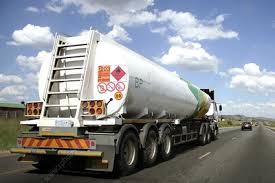FG Bans Petrol Tankers From Operating in Nigerian Roads
The federal Government of Nigeria has banned the operation of petrol tankers carrying over 60,000 litres, on Nigerian federal roads and loading at depot.
Announcing this development at a briefing on Abuja, on Wednesday, Ogbugo Ukoha, the Nigerian Midstream and Downstream Petroleum Regulatory Authority Executive Director, Distribution System, Storage and Retailing Infrastructure, said the ban is effective from 1st March, 2025.
This announcement was a product of the meeting of the company’s stakeholders following the recent and recurring explosions in Nigeria, lately.
Related:
BREAKING!! Fire Guts Fuel Station in Adamawa as Two Petrol Tankers Explode
18 People Burnt To Ashes, 10 Vehicles Destroyed As Tanker Fire Wreaks Havoc in Enugu (Photos)
However, while the Government announced this even previously at a stakeholders meeting, Yusuf Othman, President of the National Association of Road Transport Owners, opposed the potential ban.
According to Othman, such a move would lead to a potential loss of over N300bn investment.
“Beginning from March 1, 2025, trucks with a capacity in excess of 60,000 litres will not be allowed to load in any loading depot of petroleum products.
”Also by the fourth quarter, we will also preclude the loading of transportation of petroleum products of any truck in excess of 45,000 litres. That is the breaking news for today,” Ukoha said.
He further stated that the ban would be in phases so that investors would have enough time to adjust to the development.
According to the NMDPRA director, the Nigerian Association of Road Transport Owners, Independent Petroleum Marketers Association of Nigeria, Standard Organisation of Nigeria, Major Oil Marketers Association of Nigeria, and Directorate of State Services were among the stakeholders that held the consensus decision at the meeting.
“Historically, we have seen an increase in the tanking capacity, the truck capacities moving from about 27,000 to 33,000 to 45,000. And I recall that the records show that in 2020, there was a stakeholder meeting where it was determined that 45,000 should be the cap.
“The Ministry of Works also has made interventions because the impact on the roads is a reality. Our study of the recent fatalities also suggests that trucks in excess of 60,000 litres have contributed to this. But at the same time, as a regulator, when you would like to begin to enforce, you also have to balance a lot of considerations.
Yes, it will have an impact on the investment and all, but we are having conversations to give everybody comfort as to, and that is why we have staggered the implementation of even the 45,000 plus to Q4 so that it gives room for all stakeholders,” Ukoha explained further.
He added that “It has to be a win-win for everybody.”







1 COMMENTS